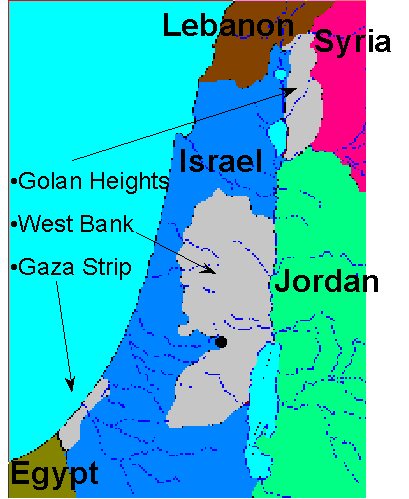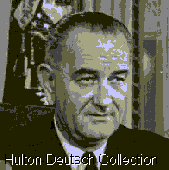|
|
|
the cold war:
international rivalry promotes conflict
|
|
|
| 1950 | May 25 - Fearing growing influence from the Soviet Union, the United States, Britain, and France issue the Tripartite Declaration. It opposes any change of the 1949 armistice boundaries by force, pledges to stop any imbalance of arms in the region, and agrees to supply both the Arab states and Israel with weapons for self-defense and "to permit them to play their part in the defense of the area as a whole." | |
| 1951 | July
20 - King Abdallah of Jordan, a secret negotiator with Israel, is
assassinated.
Oct. 31 - US, Britain, France, and Turkey propose a Middle East Defense Command, to block Soviet influence. Egypt is first approached, but rejects the idea, thereby killing it. Israel unofficially reports willingness to join the effort. |
|
| 1952 | 684,000 additional Jews have arrived in Israel since its independence, many from Arab countries where their families had lived for centuries. | |
| 1953 | The Eisenhower administration in the United States makes friendly overtures toward the Arab states, particularly Egypt and Iraq, in order to promote a regional defense against communism. | |
| 1954 | U.S.
gives military and economic aid to Iraq. Israel protests, arguing that
Iraq had never signed an armistice with Israel.
Britain and Egypt negotiate to transfer control of the Suez Canal from Britain to Egypt. |
|
| 1955 | Iraq
joins the "Baghdad Pact" of Turkey, Pakistan, and later Britain.
Israel fears a regional alliance which excludes them.
An Israeli ship is seized in the Suez Canal. Two Israelis are executed in Egypt. Israel raids the Gaza Strip in retaliation. President Nasser of Egypt, offended by U.S. aid to Iraq, rejects the Baghdad Pact. He makes an arms deal with the Soviet Union. By defying the West and getting arms to use against Israel, his status among Arabs soars. The arms balance of the Tripartite Declaration is shattered. Israel, expecting more U.S. support, is stunned when U.S. and Britain court Nasser by helping build the Aswan Dam. Israeli requests for arms purchases are deferred. |
|
| 1956 | March
18 - Israeli President David Ben Gurion warns that war with Egypt is
certain unless Israel gets arms soon.
Egypt sells arms to Algeria, which is at war with France. France sells arms to Israel. The U.S. withdraws aid for Aswan Dam when Egypt persists in attacking the Baghdad Pact. Nasser nationalizes the Suez Canal. Syrian and Jordanian forces are put at the disposal of Egypt. Nasser boasts that Israel is doomed. October 29 - The Sinai-Suez War erupts when Israel invades the Sinai peninsula. Britain and France also move against Egypt, taking Port Said. By Nov 5, Israel holds the Gaza Strip and the Sinai. U.S. fears huge Middle East war destroying all Western interests, leaving U.S.S.R. in control. U.S.S.R. threatens Britain, France, and Israel with direct intervention. Britain and France withdraw. Israel uneasily returns the Sinai and the Gaza Strip to Egypt. |
 |
| 1959 | A
powerful Soviet-Egyptian presence grows in the region. Egypt, Syria, and
Yemen unite to form the United Arab Republic under Nasser's control.
Israel's strong military prevents him from exercising his power to its
fullest.
Revolution in Iraq overthrows its pro-western regime. The Baghdad Pact is ended. Lebanon becomes officially "neutral," and Jordan and Saudi Arabia cautiously tilt toward the West. A cold-war for Arab dominance of the region occurs between the United Arab Republic and Iraq, now under a communist government. Some in Syria are attracted toward Iraq and away from the U.A.R. The Soviet Union courts the favor of the new Iraqi regime. Nasser denounces Soviet attempts to mastermind "a Red Fertile Crescent [Iraq, Syria, Jordan, and Palestine], with Baghdad as a command post of the counterrevolution against Arab nationalism." He begins making overtures to the West. A long-lasting stalemate emerges. Israel is firmly in the Western Camp, being on increasingly good terms with the U.S., France, and Britain. |
|
| 1961 | After a military coup, Syria withdraws from the United Arab Republic. | |
| 1963 | U.S.
makes first sizable arms sale to Israel.
The communist Iraqi regime is overthrown by forces hostile to both USSR and the West. USSR seeks to renew ties with Nasser and Egypt. |
|
| 1964 | USSR
begins massive aid program to Egypt and to Arab revolutionary movements.
Soviet propaganda accuses U.S. of imperialist hostility against Arab
nationalism, with Israel as the chief instrument of American aggression.
Arab leaders form the Palestine Liberation Army and Palestinian Liberation Organization (PLO). The use of the term "Palestinian" to refer to the indigenous Arab populations in Israel, the West Bank, and in refugees camps in various Arab countries grows. |
|
| 1966 | A
new government comes to power in Syria which is more interested in
cooperating with Nasser in Egypt. With Soviet encouragement, Syria and
Egypt sign a joint defense treaty.
Soviets begin a steady stream of warnings that Israel intends to invade Syria. In fact, Israel plans no invasion, but does intend to strike against Syrian guerrillas who are attacking Israeli settlements in the north. |
|
| 1967 | April
- Syria, aided by al Fatah, a newly-founded Palestinian guerrilla
group, begins to divert one of Israel's water sources. Israel responds
with force, buzzing Damascus with its jets and warning of increased
retaliation unless the Syrians desist. Soviets again tell Egypt that
Israel is planning to conquer Syria.
May - Arab unity reaches a new height. Nasser puts Egyptian forces on full alert and orders U.N. observers to leave the Sinai. He closes the Gulf of Aqaba to Israeli shipping and declares that Israel must be destroyed to resolve the Palestinian question. King Hussein of Jordan signs a joint defense treaty with Egypt that places Jordanian forces under Egyptian command in case of war. Jordan allows Iraqi troops into its territory and builds good relations with the PLO. War appears inevitable. Nasser seeks to maneuver Israel into beginning the shooting. He does not wish to appear as the aggressor and so risk direct U.S. intervention. June 5 - The Six-Day War begins when Israel stages simultaneous air strikes that destroy the air forces of Egypt, Syria, and Jordan, leaving their ground forces at the mercy of the Israeli air force. By June 11 Israel gains control of the Sinai, the Gaza Strip, the Golan Heights, and the West Bank. Nov. 22 - The U.N. issues Resolution 242 which rejects the acquisition of territory by war, and insists on the need "for a just and lasting peace in which every state in the area can live in security." It calls for: 1) The withdrawal of Israeli forces from territories it has come to occupy; 2) The termination of all states of belligerency and respect for and acknowledgment of the sovereignty, territorial integrity, and political independence of every state in the area and their right to live in peace with secure and recognized boundaries free from threats or acts of force. |
|
 |
||
| Israel
refuses to return any of the captured territory without a peace treaty and
recognition by her Arab neighbors." U.S. President Johnson agrees that Israel should not cede any occupied regions until a comprehensive regional peace settlement is achieved. This is the origin of the "Occupied Territories." U.S. gives massive arms support to Israel. |
 |
|
After
the war:
|
||
| 1968 | Nasser sparks fedayeen, or Palestinian guerrilla, attacks on Israel from the Gaza strip and elsewhere. The fedayeen/PLO declare their intent is to eradicate Israel. | |
| Under Prime Minister Golda Meir, Israel responds with a "counter-attrition" campaign against Egypt. She quietly pursues negotiations for peace. |  |
|
| 1970 | The
Soviets agree to give Nasser a sophisticated air defense system, Soviet
teachers and military advisors
August - both Egypt and Israel accept a U.S. cease-fire plan. Thus ends what Egyptians called "The War of Attrition," and Israelis named "The Thousand Day War." Jordan also agrees to the plan. The PLO, ensconced in Jordan, sees the Peace Process as against their interests. In the following months, Soviet-Egyptian large scale violation of the cease-fire occurs with their deployment of numerous missile launching sites. Sept. - The "Popular Front for the Liberation of Palestine," a PLO movement, brings three hijacked commercial airliners to an abandoned airstrip in Jordan. They demand the release of all Palestinian prisoners in various countries. King Hussein responds with an all-out attack on the guerrillas, who vow to depose him. Syria invades Jordan. The U.S. and Israel agree to a plan to use the Israeli air force to come to Jordan's aid if needed. Encouraged, Hussein throws his entire military power against the Syrians and Palestinians, driving them from Jordan. Sept. 28 - Egyptian president Nasser dies. Anwar Sadat succeeds him. |
|
| 1973 | Sept
- a chance for secret "proximity talks" between Egypt and Israel
is derailed by the massacre of Israeli athletes at the Munich Olympics.
Oct - Sadat and Syrian President Assad plan a surprise attack to end the stalemate. They aim to use their larger standing forces to triumph before Israeli reserves can be mobilized. Oct. 6 - The Yom Kippur War begins. Surprise allows the Syrian-Egyptian forces to achieve their goals in the Sinai, but by Oct. 8, the first Israeli reserves counterattack. By Oct. 13, the Syrian front is ten miles nearer to Damascus than before. By Oct. 25, Israel has forces west of the Suez Canal. Oct. 16 - Arab states impose total oil boycott on the U.S. in retaliation for U.S. aid to Israel during the war. Oct. 22 - U.N. passes Resolution 338, calling for a cease-fire based on the terms of Resolution 242 and linked to immediate peace negotiations between the warring parties. |
|
| 1974 | Jan.
18 - The "shuttle diplomacy" of U.S. secretary of state Henry
Kissinger produces the first Israeli-Egyptian Sinai agreement.
March - Arab states lift their oil embargo against the U.S. May 31 - Further shuttle diplomacy yields an Israel-Syria accord. Oct. - attempts to secure an agreement between Israel and Jordan falter. Jordan seeks to retain its role as spokesperson for the Palestinians of the West Bank, a role which the PLO claims. By the year's end, the Arab League agrees that the PLO is the sole representative of the Palestinians, thus ending a Jordanian role. This decision prompts UN recognition of the PLO. |
 |
| 1975 | Sept.
4 - A second Israeli-Egyptian Sinai Accord is signed. Borders between the countries
are normalized and the Suez Canal is opened to Israel.
Civil war erupt in Lebanon between Christians and Muslims over various issues, including the status of the PLO in the country. |
|
| 1976 | Jan.
- Syria sends PLO troops into Lebanon.
April - Syrian troops enter Lebanon in April to support leftist/Muslim/PLO forces against right-wing Christian forces. Fearful of Arab criticism that it is trying to conquer Lebanon, Syria tries to end the civil war with a constitutional reform that gives modest gains to the Muslims. Christians agree to this, but PLO-supported Muslims reject it. June 1 - The PLO threatens to overwhelm Christian forces. Syrian troops move to halt them. The PLO is decimated by the combined Syrian-Christian attack. Israel aids Christians in south Lebanon. Nov. - The Arab League allows Syria to impose a cease-fire. |
|
| 1977 | Riots
occur in Egypt over economic strains of defense burden.
U.S. President Jimmy Carter's efforts to bring the PLO to peace talks fail when the PLO refuses to accept U.N. Resolution 242 (which requires a recognition of the right of Israel to exist). Nov. 19 - Egyptian President Anwar Sadat travels to Israel and addresses the Knesset. He and Israeli Prime Minister Menachem Begin pledge to make peace. |
 |
| 1978 |
Sept 5-17 - The "Camp David Summit" between Sadat, Begin, and Carter results in a precise scenario for an Israeli-Egyptian Peace Treaty with the exchange of full diplomatic relations, and a vague statement about the Gaza Strip and West Bank.
Nov. 17 - an Arab summit condemns the Camp David accords. |